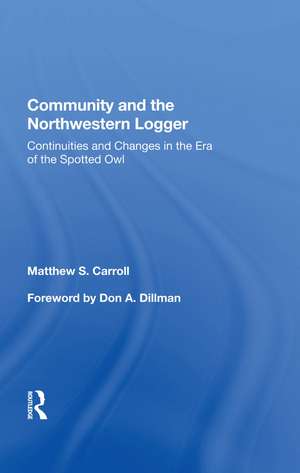Community And The Northwestern Logger: Continuities And Changes In The Era Of The Spotted Owl
Autor Matthew S. Carrollen Limba Engleză Hardback – 7 iun 2019
Preț: 764.20 lei
Preț vechi: 1102.79 lei
-31% Nou
Puncte Express: 1146
Preț estimativ în valută:
146.23€ • 159.34$ • 123.22£
146.23€ • 159.34$ • 123.22£
Carte tipărită la comandă
Livrare economică 23 aprilie-07 mai
Preluare comenzi: 021 569.72.76
Specificații
ISBN-13: 9780367012502
ISBN-10: 0367012502
Pagini: 192
Dimensiuni: 147 x 224 mm
Greutate: 0.45 kg
Ediția:1
Editura: Taylor & Francis
Colecția Routledge
Locul publicării:Oxford, United Kingdom
ISBN-10: 0367012502
Pagini: 192
Dimensiuni: 147 x 224 mm
Greutate: 0.45 kg
Ediția:1
Editura: Taylor & Francis
Colecția Routledge
Locul publicării:Oxford, United Kingdom
Cuprins
Foreword -- Community and the Northwestern Logger -- Community as an Idea: A Conceptual Issue with Practical Implications -- The Historical Context -- Overview of the Northwestern Logger’s Social World -- The Attributes of the Logge’s Social World: Identity, Friendship Patterns, and Shared Reality -- Finding Work -- The Logger and the Spotted Owl -- The Future of Northwestern Loggers and Their Communities -- Epilogue
Descriere
It has often been said that natural resource and environmental problems cannot be solved without solving human problems. In this book, Matthew Carroll examines the economic and social circumstances of northwestern U.S. loggers in the face of shifts in environmental politics, dramatic reductions in timber harvest levels on federal lands, and changing technology and market forces—among other factors that are rapidly transforming their industry, their livelihoods, and their communities. Drawing upon sociological fieldwork in logging communities that he conducted at various times over a period of nearly a decade and using the spotted owl-old growth controversy as a case study, Carroll provides a rich and detailed picture of life among northwestern loggers. He lays out the human dimensions and dilemmas of the timber crisis. Expanding it from the oversimplified owl-versus- logger confrontation, he puts these issues in a historical and policy context and suggests parallels to other controversies such as public grazing and federal or state river protection. Carrol’s work revives the concept of occupational community and shows ways it can be used to understand the dynamics of rural occupations linked to resource extraction.
